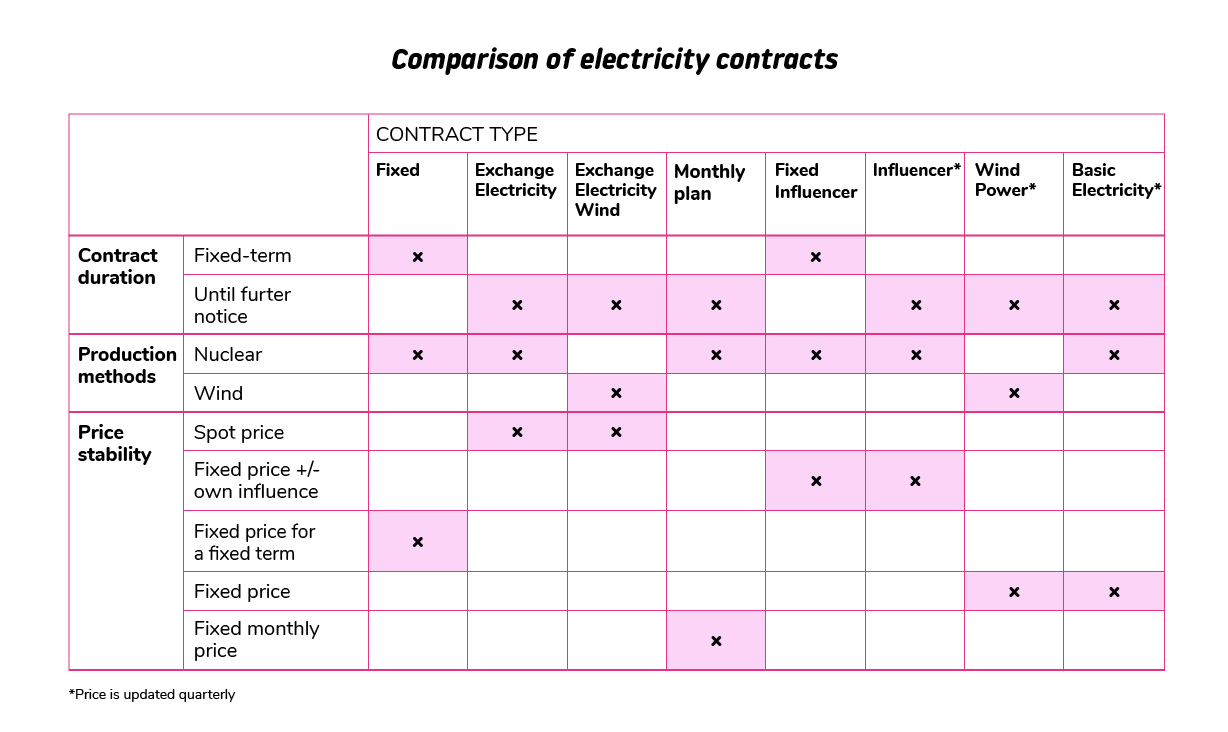
Compare Electricity Contracts & Contract Prices
How to choose the right electricity contract? On this page, we have compiled all the things you need to consider when comparing electricity contracts. Find the best and most affordable electricity contract for you from our selection, and order electricity easily online.
Electricity contract price comparison
The most affordable and best electricity contract is not the same for everyone. That’s why we offer our customers a variety of contracts to compare, so you can find the electricity contract that suits you best.

Invoice size
We will estimate your yearly consumption based on the data you give us. You can also type in the yearly consumption if you know it. Based on the estimation you can compare monthly prices of different contracts.
-
Recommended Emission free DiscountRecommended Emission free DiscountRecommended Discount
Fixed
Worry-free fixed price Nuclear energy from emission-free production Choose the contract period that suits you bestWorry-free fixed price Nuclear energy from emission-free production Choose the contract period that suits you bestWorry-free fixed price Nuclear energy from emission-free production Choose the contract period that suits you best10,19
c/kWh
Basic charge:
4,55
€/mo
We do not recommend the product with this annual consumption.Estimate: kWh, your bill would be about €/month9,24
c/kWh
Basic charge:
4,55
€/mo
We do not recommend the product with this annual consumption.Estimate: kWh, your bill would be about €/month8,28
c/kWh
Basic charge:
4,55
€/mo
We do not recommend the product with this annual consumption.Estimate: kWh, your bill would be about €/month -
Spot price Discount
Exchange electricity
The price varies quarterly Save money by timing your consumption Smart Home as a customer benefit – take advantage & save moneyUntil further notice
0,48
c/kWh
+ Spot-priceBasic charge:
4,90
€/month
Last month's average price of exchange electricity was 14,72c/kWh. Laskun koko riippuu kulutusprofiilista ja Spot-hinnasta. -
Emission free Discount
Influencer
Benefits of exchange electricity, flexible indefinite-term contract A fixed price component combined with Own influence Own influence is usually +/- 2 c/kWhUntil further notice
1.1. – 31.3.202611,30
c/kWh
Basic charge:
4,90
€/kk
We do not recommend the product with this annual consumption.Estimate: kWh, your bill would be about €/month -
Emission free Discount
Basic electricity
Nuclear energy from emission-free production No binding contract period A simple electricity contract with a price that is adjusted four times a yearUntil further notice
1.1. – 31.3.202612,60
c/kWh
Basic charge:
4,90
€/month
We do not recommend the product with this annual consumption.Estimate: kWh, your bill would be about €/month -
100% wind power Discount

Wind power
No binding contract period Electricity verified as wind power A simple electricity contract with a price that is adjusted four times a yearUntil further notice
1.1. – 31.3.202613,05
c/kWh
Basic charge:
4,90
€/month
We do not recommend the product with this annual consumption.Estimate: kWh, your bill would be about €/month -
100% wind power Spot price Discount
Exchange electricity wind power
The price varies quarterly Save money by timing your consumption Smart Home as a customer benefit – take advantage & save moneyUntil further notice
0,94
c/kWh
+ Spot-priceBasic charge:
4,90
€/month
Last month's average price of exchange electricity was 14,72c/kWh. Laskun koko riippuu kulutusprofiilista ja Spot-hinnasta. -
New! Emission free DiscountNew! Emission free DiscountNew! Emission free DiscountNew! Emission free Discount




Monthly plan
Choose a monthly plan that suits your needs A worry-free contract where you know in advance the size of the electricity bill Suits a small one-room apartmentChoose a monthly plan that suits your needs A worry-free contract where you know in advance the size of the electricity bill Suits a one-room or two-room apartmentChoose a monthly plan that suits your needs A worry-free contract where you know in advance the size of the electricity bill Suits a one-room or two-room apartment with a saunaChoose a monthly plan that suits your needs A worry-free contract where you know in advance the size of the electricity bill Suits a three-room apartmentUntil further notice
Monthly charge10,50
€/month
Included energy75
kWh/month
Excess energy consumption: 16,60 c/kWh
We do not recommend the product with this annual consumption.Estimate: kWh, your bill would be about €/monthMonthly charge21,00
€/month
Included energy150
kWh/month
Excess energy consumption: 16,60 c/kWh
We do not recommend the product with this annual consumption.Estimate: kWh, your bill would be about €/monthMonthly charge35,00
€/month
Included energy250
kWh/month
Excess energy consumption: 16,60 c/kWh
We do not recommend the product with this annual consumption.Estimate: kWh, your bill would be about €/monthMonthly charge49,00
€/month
Included energy350
kWh/month
Excess energy consumption: 16,60 c/kWh
We do not recommend the product with this annual consumption.Estimate: kWh, your bill would be about €/month -
Emission free Discount
Student electricity 12 months
Basic charge -50% Easy to terminate when moving Available only for apartmentsIn effect 12 months
9,24
c/kWh
Basic charge:
2,28
€/mo
We do not recommend the product with this annual consumption.Estimate: kWh, your bill would be about €/month

Influencer
- Between fixed-price and spot-price electricity.
- A more stable option than exchange electricity.
- Produced emission-free with nuclear energy.
- The contract is valid until further notice.
Exchange Electricity
- Influence the price of your electricity by timing your consumption.
- Pricing in accordance with the electricity exchange.
- Produced emission-free with nuclear energy. Choose renewable Exchange Electricity Wind if desired.
- The contract is valid until further notice.


Fixed
- Lock in the electricity price for the contract period.
- Produced emission-free with nuclear energy.
- Emission-free.
Basic Electricity
- Produced emission-free with nuclear energy.
- Fixed price, updated 4 times a year.
- The contract is valid until further notice.


Wind Power
- 100% renewable electricity.
- Verified electricity from wind power.
- Fixed price, updated 4 times a year.
- The contract is valid until further notice.
Exchange Electricity – time your consumption and save money
Exchange Electricity and Exchange Electricity Wind
- What does the price consist of? The price consists of the varying spot price of electricity, a basic charge, and a commission fee.
- Who is it for? For those who are willing to monitor the spot price of electricity and time their consumption accordingly. The higher the electricity consumption, the greater the potential savings.
- Eco-friendliness? Exchange Electricity is produced emission-free with nuclear energy. You can also choose the 100% wind-powered Exchange Electricity Wind contract.
- Pros? The opportunity to significantly reduce your electricity bill by timing consumption to cheaper times. Often quite affordable in the long run. Short 2-week notice period.
- Cons? The effort required to monitor the spot price of electricity. The unpredictability of spot price trends poses a risk.
The spot price (cents/kWh) refers to the 15-minute regional price for Finland announced by the Nordic electricity exchange Nord Pool. It is usually high on weekday mornings and afternoons when electricity demand peaks. Market electricity is traditionally cheap at night and on weekends or, for example, when there is a lot of wind power available.
You can conveniently monitor the spot price via Vaasan Sähkö’s mobile app.
The next day’s spot prices are announced the day before, allowing you to plan your electricity usage in advance.
Learn more about Exchange Electricity.
Example of an Exchange Electricity customer:
Varpu has an electrically heated home. She has installed automation in her water heater, so the water heats up during the cheapest times of the day automatically. Varpu’s smart electric car charger charges the plug-in hybrid car on the same principle.
Varpu actively monitors the spot price of electricity. Windy days, when electricity is cheap, are laundry days. Varpu uses the oven on weekends.
Influencer Electricity contract – a more stable option
Influencer contract
- What does the price consist of? The price consists of a basic charge (€/month), an energy charge (cents/kWh) updated every three months, and a personal impact adjustment, which can decrease or increase the final energy price. If you use electricity during times when the market price is low, your electricity bill decreases.
- Who is it for? For those who want a more stable contract than Exchange Electricity but still want to benefit from spot price fluctuations.
- Eco-friendliness? The electricity for the Influencer contract is produced emission-free with nuclear energy.
- Pros? Protects your wallet during months when the market price of electricity is high. Still offers the opportunity to affect the final bill amount by optimizing consumption. 2-week notice period.
- Cons? You won’t benefit as much from low market prices as with a Exchange Electricity contract.
You can affect your electricity bill with personal impact adjustment. If you use electricity when the market price is low – usually at night, on weekends, and when there is plenty of wind power available – your personal impact is negative, and your energy fee decreases. If your consumption is higher during weekday afternoons and mornings, when the market price is traditionally high, the personal impact increases the final energy price.
The energy fee protects the customer from high average market prices. Market prices are not directly reflected in the customer’s bill. Only whether consumption is weighted towards cheaper or more expensive hours than the monthly average affects the final price.
Learn more about the Influencer contract.
Example of a customer for whom the Influencer contract is suitable:
Varpu has timed her water heating to the cheapest hours of the day using a relay installed in the electric boiler. She is a night owl and does laundry in the evenings after the children have gone to bed. The spot price is usually low at these times, and the personal impact reduces the final energy fee. Thus, the personal impact is negative.
Varpu loves baking. On weekends, the oven is hot for many hours. The spot price is usually lower on weekends than on weekdays, and Varpu benefits from the Influencer contract.
Fixed-price electricity contract is easy and worry-free
Basic Electricity and Wind Power
- What does the price consist of? The price consists of a basic charge (€/month) and an energy charge (cents/kWh). The price is updated four times a year following the market price of electricity, meaning the price can rise or fall.
- Who is it for? Suitable for those who value ease in handling electricity matters. The fixed-price Wind Power or Basic Electricity contract is valid as long as you want.
- Ecological aspect? Wind Power is produced with renewable wind power. Basic Electricity is produced emission-free with nuclear energy.
- Pros? No need to actively monitor electricity prices. The final amount depends only on how much electricity you use. If the electricity price drops quarterly, you benefit financially. You can cancel at any time with a two-week notice.
- Cons? No opportunity to influence your electricity bill by smartly timing your consumption. The price may rise if the market price of electricity increases.
Example of a customer for whom a fixed-price contract is the best solution:
Jarkko lives a busy student life and mainly sleeps in his studio apartment. He only thinks about electricity when paying the bill. He has no time or interest in optimizing his electricity usage. He does laundry and plays PlayStation whenever he happens to be at home.
Fixed-term contract – lock in the electricity price
Fixed 6 months, 12 months, and 24 months
- What does the price consist of? The price consists of a basic charge (€/month) and an energy charge (cents/kWh).
- Who is it for? Suitable for those who think the most important aspect of electricity matters is price stability. In a fixed-term contract, the electricity price is locked in for the duration of the contract.
- Ecological aspect? Fixed is produced emission-free with nuclear energy.
- Pros? The ability to lock in the electricity price for the entire contract period. Increases in energy prices do not affect your price.
- Cons? No possibility to change the contract before the end of the term. The exception is in the case of a move: then we can terminate the contract mid-term. No opportunity to influence the electricity price with smart consumption.
Example of a customer for whom a locked-in price is suitable:
Tuisku likes to plan monthly expenses in advance and has therefore chosen a fixed-term electricity contract. Tuisku’s electricity consumption is quite steady, so he always knows almost exactly what the next electricity bill will be.
Compare: electricity for a house, terrace house, and apartment building
The type of home you live in can have a big impact on what type of electricity contract suits you the best
Living arrangements typically affect electricity consumption and thus which electricity contract is the most affordable and sensible choice for your home.
Compare electricity contracts for a house:
Electricity consumption in a detached house depends largely on the heating method. Homes with direct electric heating consume a lot of electricity due to electric heating. Heat pump solutions also consume electricity. If there are several residents, washing machines and dishwashers are used frequently. An electric car adds to consumption even more.
- Exchange Electricity is a good option for a home with high energy consumption if the residents are willing and able to schedule electricity use for times when the spot price is low. The higher the electricity consumption, the more beneficial it is to shift usage to cheaper times.
- The Influencer contract also provides the opportunity to reduce the electricity bill with smart consumption behavior but with fewer risks.
- If monitoring and timing your consumption doesn’t appeal to you, choose fixed-price Wind Power or Basic Electricity.
- Lock in the electricity price for the contract period by choosing Fixed. This brings predictability to your electricity bill.
Compare electricity contracts for a townhouse:
Townhouses follow similar consumption patterns to detached houses because the heating method can also be electric heating or another type.
Compare electricity contracts for an apartment building:
Heating generally does not affect the electricity bills of apartment, as apartment buildings are often heated with district heating. Therefore, electricity consumption in apartment buildings is usually quite low.
The Influencer contract can also bring a negative personal impact and savings to apartment electricity bill if they schedule their consumption – for example, doing laundry and running the dishwasher – during cheaper times.
Fixed is suitable for apartment dwellers who want to lock in the price and use fossil-free electricity.
If you want to keep electricity matters as simple as possible, choose fixed-price and open-ended Wind Power or Basic Electricity.
Comparing electricity contracts: emission-free and renewable electricity
Choosing green electricity is an easy eco-friendly act. We offer both emission-free and 100% renewable electricity. Compare our green contracts:

Renewable electricity
- Certified electricity produced with Finnish wind power.
- 100% renewable wind power.
- Our wind electricity products are Exchange Electricity Wind and Wind Power. The contracts are valid until further notice
Emission-free electricity
- Produced emission-free with nuclear energy.
- Nuclear power is produced in Olkiluoto under strict regulatory supervision.
- The nuclear power we sell is always produced with certified origin.
- All the electricity we sell is produced without emissions.

Choosing an electricity contract – ABC
- The same contract is not the cheapest for everyone.
- When choosing a contract, consider not only the price but also the contract duration and preferred production method. Think about your own preferences: What suits your current life situation?
- Those who value ease choose Basic Electricity, Wind Power, or Fixed.
- For those excited about following the spot price of electricity, we recommend Exchange Electricity. If spot price fluctuations are daunting, choose the more stable Influencer.
- Our renewable electricity products are Wind Power and Exchange Electricity Wind.
Comparing electricity contracts: Frequently asked questions
Which one is cheaper, a fixed-term contract or an open-ended contract?
Traditionally, fixed-price fixed-term and open-ended contracts have been in the same price range over the long term.
More than the type of contract, the price is influenced by the type of electricity consumer and whether they choose a spot price or a fixed-price contract. An active electricity user can save significantly on their electricity bill by optimizing consumption, as the spot price can fluctuate considerably throughout the day.
Is renewable electricity more expensive than other electricity?
We purchase renewable energy guarantees of origin for our Wind Power. This incurs an additional cost, which appears as a small increase in the price of Wind Power.
How is Exchange Electricity and Basic Electricity produced?
Exchange Electricity and Basic Electricity have been produced without emissions. Their origin is verified with guarantees of origin (GO).
Can a fixed-term contract be terminated if you move?
Yes, a fixed-term contract can be terminated if you move. In the case of a move, a fixed-term electricity contract can be canceled before the end of the term by contacting our customer service.